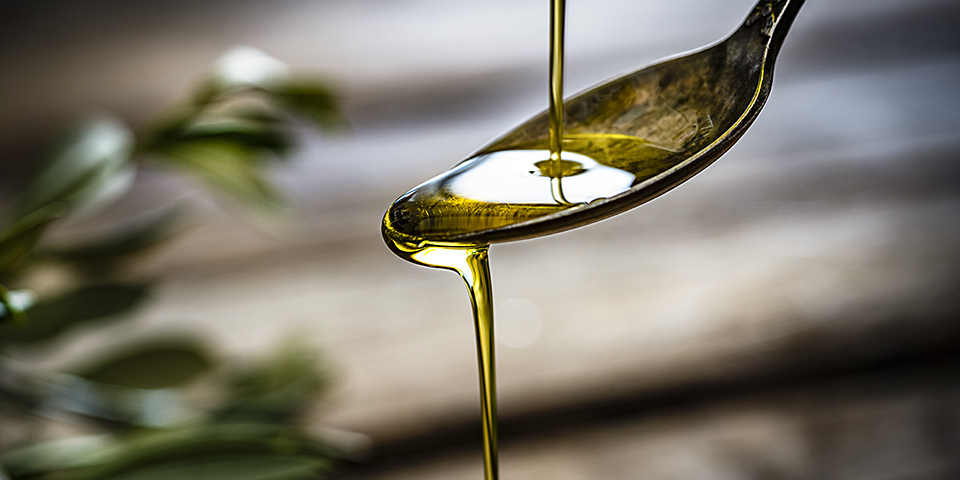“Is olive oil good for you?” That’s probably not a question that crosses your mind when you grab that bottle of olive oil to cook with.
Olive oil is ubiquitous, after all. It’s the go-to oil for almost any recipe, whether you’re cooking something savory or baking up something sweet (lemon olive oil cake, anyone?).
But is olive oil good for you?
Let’s review the basics to find out what makes olive oil so healthy and why moderation is the key when adding it to your diet.
What Is Olive Oil?
Extra-virgin olive oil (also lovingly referred to as “EVOO”) is extracted by pressing ripe olives without using chemical solvents or high heat.
The process protects beneficial phenols in the oil, which are also the same substance that give EVOO its fruity and pungent flavor.
“The difference between olive oil and EVOO is how they are processed, with EVOO being the least processed,” says Brittany Crump, M.P.H, R.D. at Savor Nutrition.
“Regular olive may be heated or chemically treated to prolong its shelf life. It may also be blended with other oils for a milder flavor. Because EVOO is less processed, it is higher in antioxidants and more flavorful. Either option is OK, but I recommend EVOO due to its higher concentration of antioxidants,” she explains.
If you’re buying olive oil for its health benefits, go with EVOO.
Most studied health benefits are linked to this particular type of olive oil. For the rest of this post, when we say “olive oil,” we’re actually referring to EVOO.
Olive Oil Nutrition
So, is olive oil good for you? Yes, but with a caveat: Olive oil is a healthy swap for other fats you currently eat. But it’s not necessarily a good idea to add more fat into your routine, especially if your goal is to lose weight.
Keep in mind that olive oil isn’t the only source of healthy fats.
If you’d rather try a different cooking oil, read The Ultimate Guide to Cooking Oils to help you figure out the best option for your diet and lifestyle.
All oils are calorie-dense, even olive oil. Here’s the olive oil nutrition for a 1 tablespoon serving:
The Benefits of Olive Oil
1. Olive oil is a staple in the Mediterranean diet
This diet is the food culture of people who live along the Mediterranean sea (think: Greece and Italy). U.S. News ranks the Mediterranean diet as the no. 1 Best Overall Diet for 4 years straight.
Since olive oil is 20% of the calorie breakdown in this diet, it’s no surprise the oil deserves some of the shine!
2. Olive oil contains healthy fats
In olive oil, much of the fat is oleic acid, a monounsaturated fat. Crump explains that studies show that consuming olive oil regularly can support heart health.
3. Olive oil contains antioxidants
Olive oil contains vitamin E, an antioxidant that can help reduce the harmful effects of free radicals. Other antioxidants unique to olive oil are phenols—oleuropein and tyrosol.
4. Olive oil might provide other benefits
An early animal study shows olive oil may help improve cognitive health. In the study, mice eating an EVOO-rich chow showed better memory and learning.
Add to this a randomized control trial of 522 human participants; the study found improved cognition in the group assigned to eat a Mediterranean diet rich in EVOO.
We can’t jump to conclusions based on just two studies, but there seems to be an emerging relationship between olive oil and brain health.
How Much Olive Oil Per Day Is Healthy?
Olive oil is a healthy fat, and it’s certainly OK to use it daily. Experts recommend that fats make up 20-35% of your total calories per day.
All these benefits shouldn’t drive you to gorge on olive oil, though — oils are still the most calorie-dense foods you can eat.
Why Olive Oil May Be Bad for You
It might be best to leave the olive oil on the shelf and choose another oil for deep-frying.
This high-heat cooking method can cause the polyunsaturated fats in oil to oxidize, destroying nutrients and creating carcinogens.
Any oil heated above its smoke point (temperature it starts to release smoke) can degrade.
EVOO has a smoke point of 350 degrees Fahrenheit, meaning it’s good for salad dressings, marinades, and maybe baking or a light saute.







